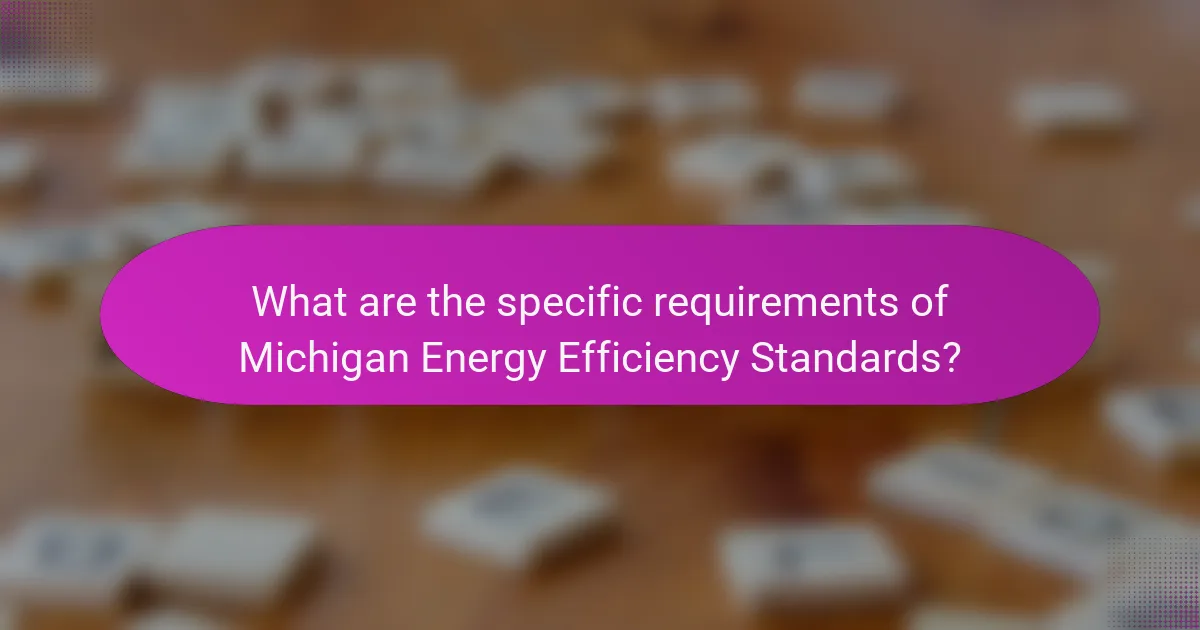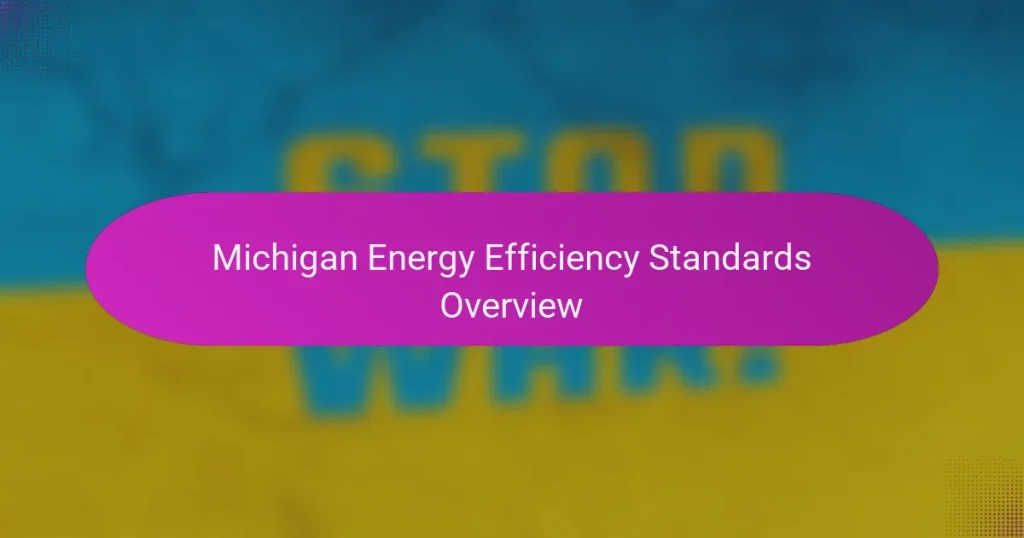
What are Michigan Energy Efficiency Standards?
Michigan Energy Efficiency Standards are regulations aimed at reducing energy consumption in the state. These standards require utilities to implement energy-saving programs. The goal is to promote energy efficiency and reduce greenhouse gas emissions. Michigan’s Public Service Commission oversees the implementation of these standards. They set specific targets for energy savings over time. Utilities must report their progress in meeting these targets. The standards also encourage the use of renewable energy sources. Overall, they play a crucial role in enhancing energy efficiency across Michigan.
How do Michigan Energy Efficiency Standards impact consumers?
Michigan Energy Efficiency Standards lower consumer energy costs and promote sustainable practices. These standards require utilities to implement energy-saving programs. As a result, consumers benefit from reduced energy bills. A study by the Michigan Public Service Commission indicates that these programs save households an average of $150 annually. Additionally, improved efficiency leads to less environmental impact. This aligns with Michigan’s goals for reducing greenhouse gas emissions. Overall, the standards create financial savings and support a healthier environment for consumers.
What are the key components of these standards?
The key components of Michigan Energy Efficiency Standards include specific energy savings targets, performance metrics, and compliance requirements. These standards mandate utilities to achieve energy savings of 1% of their total retail sales annually. They also require the implementation of cost-effective energy efficiency programs. The standards emphasize transparency and accountability in reporting energy savings. Utilities must document their efforts and the outcomes of their programs. Additionally, there are guidelines for evaluating the effectiveness of energy efficiency measures. These components collectively aim to reduce energy consumption and promote sustainable practices in Michigan.
How do these standards affect energy consumption in homes?
Michigan energy efficiency standards significantly reduce energy consumption in homes. These standards mandate the use of energy-efficient appliances and building practices. For example, homes must meet specific insulation and HVAC efficiency ratings. Compliance with these standards can lead to a reduction in energy usage by up to 30%. Additionally, homes that adhere to these standards often experience lower utility bills. According to the U.S. Department of Energy, energy-efficient homes contribute to a decrease in overall energy demand. This reduction helps to lower greenhouse gas emissions. Therefore, Michigan’s energy efficiency standards play a crucial role in promoting sustainable energy consumption in residential settings.
Why were Michigan Energy Efficiency Standards implemented?
Michigan Energy Efficiency Standards were implemented to reduce energy consumption and promote sustainability. These standards aim to lower greenhouse gas emissions and decrease energy costs for consumers. The implementation was driven by the need for a reliable energy supply and to enhance the overall efficiency of energy use in the state. Studies indicate that energy efficiency measures can significantly reduce demand on the electrical grid. In 2019, the Michigan Public Service Commission reported that energy efficiency programs saved consumers approximately $1.5 billion.
What goals do these standards aim to achieve?
The Michigan Energy Efficiency Standards aim to reduce energy consumption and promote sustainable practices. These standards focus on increasing energy efficiency in various sectors, including residential, commercial, and industrial. They seek to lower utility costs for consumers and businesses. Additionally, the standards aim to decrease greenhouse gas emissions. By implementing these measures, Michigan intends to enhance energy security and reduce reliance on fossil fuels. The standards also encourage innovation in energy-saving technologies. Overall, they contribute to a more sustainable energy future for the state.
How do these standards align with national energy policies?
Michigan energy efficiency standards align with national energy policies by promoting energy conservation and reducing greenhouse gas emissions. These standards support the goals set by the U.S. Department of Energy, which aims to improve energy efficiency across states. Michigan’s initiatives contribute to national targets for energy reduction, as outlined in the Clean Power Plan. Furthermore, the standards help meet federal requirements for energy efficiency in appliances and buildings. This alignment ensures that Michigan’s policies are consistent with broader national efforts to enhance energy sustainability and security.
Who oversees the implementation of Michigan Energy Efficiency Standards?
The Michigan Public Service Commission (MPSC) oversees the implementation of Michigan Energy Efficiency Standards. The MPSC is responsible for regulating utility companies in Michigan. They ensure compliance with energy efficiency regulations. This includes evaluating energy savings programs. The commission also monitors the effectiveness of these programs. Their goal is to promote energy conservation and reduce costs for consumers. The MPSC’s oversight helps in achieving the state’s energy efficiency goals.
What role do state agencies play in enforcing these standards?
State agencies enforce Michigan’s energy efficiency standards by implementing regulations and monitoring compliance. They develop guidelines that utilities and businesses must follow to meet energy-saving goals. Agencies conduct audits and inspections to ensure adherence to these standards. They also provide technical assistance and training to support stakeholders in achieving compliance. Additionally, state agencies may impose penalties for non-compliance to encourage adherence. Data collected from monitoring activities helps refine and improve energy efficiency programs. The Michigan Public Service Commission is a key agency in this enforcement process. It oversees utility programs and evaluates their effectiveness in meeting state energy goals.
How do utility companies contribute to the standards’ success?
Utility companies contribute to the standards’ success by implementing energy efficiency programs. These programs promote the adoption of energy-saving technologies among consumers. By providing incentives and rebates, utility companies encourage households and businesses to invest in energy-efficient appliances. This leads to reduced energy consumption and lower utility bills for customers. Additionally, utility companies monitor and report energy savings achieved through these programs. This data helps in evaluating the effectiveness of the standards. According to the Michigan Public Service Commission, utility-led initiatives have resulted in significant energy savings across the state.

What are the specific requirements of Michigan Energy Efficiency Standards?
The Michigan Energy Efficiency Standards require utilities to achieve specific energy savings targets. These targets are set at 1% of the previous year’s retail electricity sales. Additionally, natural gas utilities must achieve savings equal to 0.75% of their prior year sales. The standards also mandate that utilities offer energy optimization programs. These programs must be cost-effective and provide a variety of energy-saving options to customers. Utilities are required to report their savings achievements annually. The Michigan Public Service Commission oversees compliance with these standards.
How do these standards apply to residential buildings?
Michigan Energy Efficiency Standards apply to residential buildings by setting requirements for energy consumption and efficiency. These standards mandate that new homes meet specific energy performance metrics. They include guidelines for insulation, windows, and HVAC systems. Compliance ensures reduced energy costs for homeowners. The standards also promote the use of energy-efficient appliances. By adhering to these regulations, residential buildings contribute to overall energy conservation. The Michigan Public Service Commission oversees the implementation of these standards. This regulatory framework aims to reduce greenhouse gas emissions and promote sustainable living.
What are the insulation requirements for homes?
Homes in Michigan must meet specific insulation requirements to comply with energy efficiency standards. The Michigan Residential Code mandates minimum insulation levels for various areas of the home. Attics require R-49 insulation, while walls need R-20 to R-25, depending on the construction type. Floors over unconditioned spaces must have at least R-30 insulation. These requirements help reduce energy consumption and improve comfort. Energy efficiency standards are enforced by local building departments, ensuring compliance during construction and renovation.
How do appliance efficiency ratings factor into these standards?
Appliance efficiency ratings are integral to Michigan’s energy efficiency standards. These ratings indicate how effectively an appliance uses energy. Higher efficiency ratings typically lead to lower energy consumption. This aligns with Michigan’s goal of reducing energy use and greenhouse gas emissions. The state incorporates these ratings into regulations to ensure compliance. For example, appliances must meet minimum efficiency levels to be sold in Michigan. This approach encourages manufacturers to produce more energy-efficient products. Overall, appliance efficiency ratings directly influence the standards set by Michigan for energy conservation.
What are the requirements for commercial buildings under these standards?
Commercial buildings under Michigan Energy Efficiency Standards must comply with specific energy performance requirements. These include adherence to the Michigan Commercial Energy Code. Buildings must achieve a minimum energy performance level based on the building type and size. Additionally, they must utilize energy-efficient systems for heating, cooling, lighting, and hot water. Compliance with these standards is verified through energy modeling or prescriptive compliance paths. Regular energy audits may also be required to ensure ongoing compliance. These requirements aim to reduce energy consumption and promote sustainability in commercial construction.
What energy-saving measures are mandated for businesses?
Businesses in Michigan are mandated to implement energy-saving measures such as energy audits and efficiency upgrades. These mandates aim to reduce overall energy consumption and greenhouse gas emissions. Specific measures include the installation of energy-efficient lighting, HVAC systems, and insulation improvements. Additionally, businesses must comply with the Michigan Uniform Energy Code, which sets minimum efficiency standards for new construction and major renovations. Compliance with these regulations is enforced by local building authorities. Failure to adhere to these mandates can result in fines and penalties. The Michigan Public Service Commission oversees and promotes these energy efficiency initiatives to ensure compliance and monitor progress.
How do these requirements vary by building type?
Energy efficiency requirements vary significantly by building type in Michigan. Residential buildings typically have stricter insulation and energy performance standards. Commercial buildings, on the other hand, focus more on HVAC efficiency and lighting systems. Industrial facilities may prioritize energy management systems over insulation. Each building type must adhere to specific codes, such as the Michigan Residential Code or the Michigan Uniform Energy Code. These codes dictate the minimum energy efficiency standards based on usage and occupancy. For example, multifamily dwellings have different standards compared to single-family homes. The variation ensures that energy efficiency measures are tailored to the unique needs and operational characteristics of each building type.

What are the benefits of complying with Michigan Energy Efficiency Standards?
Complying with Michigan Energy Efficiency Standards offers several benefits. It reduces energy consumption, leading to lower utility bills for consumers. Businesses can also save on operational costs through improved energy efficiency. Compliance enhances environmental sustainability by decreasing greenhouse gas emissions. Furthermore, it can increase property values due to energy-efficient upgrades. According to the Michigan Public Service Commission, energy efficiency programs have saved consumers over $5 billion since 2009. These savings demonstrate the financial advantages of adhering to the standards.
How do these standards contribute to cost savings for consumers?
Michigan Energy Efficiency Standards lower energy consumption, which directly reduces utility bills for consumers. By mandating higher efficiency for appliances and buildings, these standards ensure that less energy is wasted. For instance, energy-efficient appliances can use up to 50% less energy than their less efficient counterparts. This results in significant savings over time, as consumers pay less for electricity and gas. Additionally, the standards promote the use of renewable energy sources, which can further decrease costs. According to the Michigan Public Service Commission, energy efficiency programs saved consumers over $4 billion from 2009 to 2019. These financial benefits illustrate how energy efficiency standards lead to substantial cost savings for consumers.
What are the long-term savings associated with energy efficiency?
Long-term savings associated with energy efficiency include reduced utility bills and lower maintenance costs. Energy-efficient appliances and systems consume less energy, leading to significant savings over time. For example, households can save an average of $500 annually on energy costs by implementing energy-efficient measures. Additionally, energy efficiency upgrades can increase property values by up to 10%. According to the American Council for an Energy-Efficient Economy, every dollar invested in energy efficiency can yield savings of $3 in energy costs over the lifespan of the measures. These savings contribute to overall economic benefits, including job creation in the energy efficiency sector.
How can compliance lead to financial incentives or rebates?
Compliance with Michigan Energy Efficiency Standards can lead to financial incentives or rebates. Utilities often provide these incentives to encourage energy-saving measures. When businesses or homeowners meet specific energy efficiency criteria, they become eligible for financial rewards. These rewards can include rebates on energy-efficient appliances or upgrades. Additionally, compliance can result in lower energy bills over time. Studies show that energy-efficient practices can reduce overall consumption significantly. For example, businesses that adopt energy-saving technologies may see savings of 10-30% on their energy costs. This financial benefit incentivizes compliance with energy efficiency standards.
What environmental benefits arise from Michigan Energy Efficiency Standards?
Michigan Energy Efficiency Standards lead to reduced energy consumption and lower greenhouse gas emissions. These standards promote the use of energy-efficient technologies. As a result, they decrease the overall demand for electricity. This reduction helps to minimize the reliance on fossil fuels. Consequently, air quality improves due to fewer pollutants being released. Additionally, these standards can lead to water conservation. Energy production often requires significant water resources. By reducing energy use, Michigan can preserve its water supply. Overall, these standards contribute to a more sustainable environment.
How do these standards help reduce greenhouse gas emissions?
These standards help reduce greenhouse gas emissions by promoting energy efficiency across various sectors. Energy efficiency reduces the amount of energy consumed, leading to lower fossil fuel use. When fossil fuels are burned for energy, they release significant greenhouse gases. For example, the U.S. Environmental Protection Agency estimates that energy efficiency measures can reduce emissions by up to 30%. By implementing these standards, Michigan aims to decrease overall energy demand. This, in turn, leads to a reduction in emissions from power plants and other energy sources. The standards also encourage the adoption of cleaner technologies. Cleaner technologies produce fewer emissions compared to traditional methods. Overall, these standards play a crucial role in mitigating climate change impacts.
What role do energy efficiency standards play in sustainability efforts?
Energy efficiency standards are critical in promoting sustainability efforts. They establish benchmarks for energy consumption in appliances and buildings. These standards help reduce greenhouse gas emissions. For example, the U.S. Department of Energy reports that energy efficiency standards have saved consumers over $1 trillion since 1987. Additionally, they encourage innovation in technology and design. By mandating higher efficiency, these standards lead to reduced energy demand. This ultimately supports a transition to renewable energy sources. Energy efficiency standards also contribute to economic savings for businesses and households.
What are best practices for homeowners to meet these standards?
Homeowners can meet Michigan Energy Efficiency Standards by implementing several best practices. First, conduct a home energy audit to identify areas for improvement. This audit provides insights into energy consumption and inefficiencies. Next, upgrade insulation in attics, walls, and floors to reduce heat loss. Proper insulation can save up to 20% on heating and cooling costs.
Additionally, install energy-efficient windows and doors to minimize drafts. Energy Star-rated windows can reduce energy bills significantly. Homeowners should also consider using programmable thermostats to optimize heating and cooling schedules. These devices can save an average of 10-15% on energy costs.
Moreover, switching to energy-efficient appliances can further enhance energy savings. Appliances with the Energy Star label use less energy and water. Lastly, homeowners should regularly maintain heating and cooling systems to ensure optimal performance. Routine maintenance can extend the lifespan of these systems and improve energy efficiency.
How can homeowners effectively assess their energy efficiency?
Homeowners can effectively assess their energy efficiency by conducting a comprehensive energy audit. This process identifies areas where energy is being wasted. Homeowners can perform a DIY audit or hire a professional for a detailed assessment. Key aspects to evaluate include insulation quality, window performance, and heating and cooling systems.
Using tools like thermal cameras can reveal heat loss in the home. Homeowners should also monitor energy bills for unusual spikes, indicating inefficiency. According to the U.S. Department of Energy, homes can save 5-30% on energy costs with proper assessments and improvements. Engaging in regular assessments ensures ongoing energy efficiency and cost savings.
What practical steps can be taken to improve home energy efficiency?
Insulating your home is a practical step to improve energy efficiency. Proper insulation minimizes heat loss in winter and keeps homes cool in summer. Sealing gaps around windows and doors also prevents drafts. This can reduce heating and cooling costs by up to 20%. Upgrading to energy-efficient appliances saves energy and lowers utility bills. Energy Star-rated appliances use 10-50% less energy than standard models. Installing programmable thermostats optimizes heating and cooling schedules. This can lead to a 10-30% reduction in energy use. Regular maintenance of HVAC systems ensures they operate efficiently. Cleaning or replacing filters can improve airflow and system performance. Lastly, using LED lighting instead of incandescent bulbs can reduce lighting energy use by about 75%. These steps collectively enhance energy efficiency in homes.
Michigan Energy Efficiency Standards are regulatory measures aimed at reducing energy consumption and promoting sustainability within the state. The standards require utilities to implement energy-saving programs and meet specific energy savings targets, ultimately benefiting consumers through lower utility bills and reduced environmental impact. Key components include compliance requirements for residential and commercial buildings, insulation standards, and appliance efficiency ratings, all overseen by the Michigan Public Service Commission. These standards not only align with national energy policies but also contribute to significant cost savings and environmental benefits, including decreased greenhouse gas emissions.

